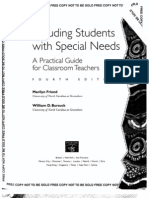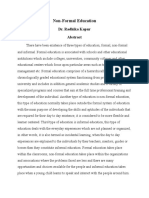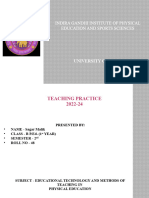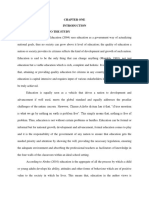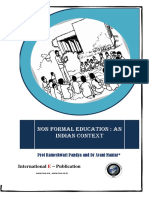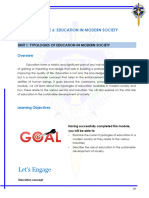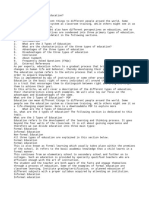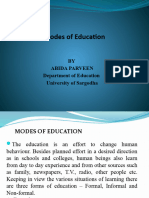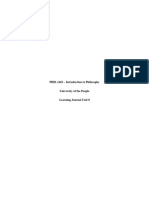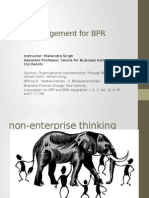Non Formal Education Transcript and Presenter
Non Formal Education Transcript and Presenter
Uploaded by
nylsie RamosCopyright:
Available Formats
Non Formal Education Transcript and Presenter
Non Formal Education Transcript and Presenter
Uploaded by
nylsie RamosOriginal Description:
Original Title
Copyright
Available Formats
Share this document
Did you find this document useful?
Is this content inappropriate?
Copyright:
Available Formats
Non Formal Education Transcript and Presenter
Non Formal Education Transcript and Presenter
Uploaded by
nylsie RamosCopyright:
Available Formats
Planning for Non-formal Education
What Is Education?
The process of facilitating learning or acquiring knowledge or skills is called
education. There are different methods to get an education. Some essential
methods to get an education are teaching, training, storytelling and
research. In most of the cases, we get education under the guidance of the
educators. Anyhow, some learners can also educate themselves.
When we talk about education, we confuse it with schooling. That’s why
most of the people think that schools and colleges are the only places to
get an education. They also look for particular people like educators or
tutors to get an education. Lots of people also think that education is a
process to prepare for future living. According to John Dewey, education is
not the process to prepare for future living. Its reason is that it is a process
of living. Therefore, while getting an education, we should try to invite truth
and possibilities. We should also try to encourage and give time to
discoveries.
THREE TYPES OF EDUCATION
1. Formal education – Structured and symmetric form of learning.
To get a formal education, students have to show presence in the
class. If students fail to show presence in the class, they will not take
exams. As a result, they will fail. In the formal education system,
teachers also try to involve the parents in the teaching-learning
process. They share the progress of the students with their parents.
Parents also play their role in the learning process of their children.
2. Informal education – It occurs outside of the asymmetric curriculum.
Informal education is an essential type of education in which we get
an education outside of the structured curriculum. To get the
informal education, students don’t need to follow the structures and
levels of the formal schools. It is a natural and spontaneous way to
get an education. In informal education, students get an education
from their experiences.
3. Non-Formal education – It occurs outside the formal school system.
The type of education that occurs outside of the formal school
system is non-formal education. The non-formal education is
different from other two types of education. We use various terms for
non-formal education. These are community education, adult
education and second-chance education. Government and private
organizations take a wide range of initiatives to provide non-formal
education in the community. For this reason, these organizations
have designed accredited courses for non-formal education. The
well-established institutions with little funding are providing non-
formal education. The main aspect of non-formal education is to
provide education to those children and young adults who can’t get
an education in the regular school system.
DepEd implements non-formal education programs through the Alternative
Learning System (ALS). Such programs contribute to adult and youth
literacy as well as education for out-of-school children. They also offer
programs on life skills, work skills, and social and cultural development.
WHAT IS ALTERNATIVE LEARNING SYSTEM OR ALS?
It is a parallel learning system in the Philippines that provides a practical
option to the existing formal instruction. When one does not have or cannot
access formal education in schools, ALS is an alternate or substitute. ALS
includes both the non-formal and informal sources of knowledge and skills.
ALS Non-formal Education happens outside the classroom, community-
based, usually conducted at community learning centers, barangay multi-
purpose hall, libraries or at home, managed by ALS learning facilitators,
such as mobile teachers, district ALS Coordinators, instructional managers
at an agreed schedule and venue between the learners and facilitators.
What is the non-formal education?
Non-formal education refers to planned, structured programs and
processes of personal and social education for young people designed to
improve a range of skills and competences, outside the formal educational
curriculum.
Presently, Non-Formal Education is viewed as one of two
components of the Alternative Learning System, the other being
Informal Education. However, informal education is a very new
program unlike non-formal education. Therefore, the major programs
now in operation which are the Basic Literacy Program, the
Accreditation and Equivalency Program and the Indigenous Peoples
Education Program are all non-formal education interventions. These are
future Alternative Learning System activities, which include:
• National Household Survey on Functional Literacy
• Development of a Special Alternative Learning System Education
Curriculum for the Hearing Impaired
• E-Test for the Accreditation and Equivalency Program
Objectives of Non Formal Education
Learning of basic skill i.e. reading, writing and general
mathematic
To enable them about the handle different tools and techniques
To make them socially and morally active towards and national
values and ideas
Examples of non-formal education
We design non-formal education courses by keeping in mind the personal
needs of the students. The most important examples of non-formal
education are given below;
The swimming sessions for the toddlers.
The educational courses and programs that we devise for the Boys
Scouts and Girls Guide come into non-formal education.
The community-based sports programs also come into non-formal
education.
All sports and fitness programs are also the best examples of non-
formal education.
The programs and courses that are developed for professional
development also come into non-formal education.
Computer and language courses.
Free online courses.
Characteristics of Non Formal Education
It is well planned and no need of any school system.
A participatory learning system e.g., (Participatory
learning is "the body of the lesson, where learners are
involved as actively in the learning process as possible.
There is an intentional sequence of activities or learning
events that will help the learner achieve the specified
objective or desired outcome")
It is open ended educational system e.g. , (When a child
is engaged in open-ended learning, he or she is not
bound by rules or instructions. There is no right or wrong
way. There is no set end to a project. On the other hand,
a closed learning system has parameters and rules.)
No need for structured course and curriculum
Age, Time and curriculum flexibility
Involvement of both public and private sector in the
process
It is not necessary to conduct exam on regular basis
Credentials like certificate and awards are not necessary
to be awarded
Self-learning is appreciated
Advantages of non-formal education
If a student gets a non-formal education, he can enjoy many benefits. The
main advantages of non-formal education are given below:
The non-formal education system is providing a chance for the
students to earn while learning. Along with learning, students can
also become self-dependent and self-independent.
To acquire the non-formal education, students have to do hard
work. Therefore, non-formal education is instilling habits of
hardworking in the students.
It is the best way for the students to utilize their free time. It means
that students can learn any skill along with formal education.
Non-formal education is providing the best chance for the students
to achieve their goals. After acquiring the non-formal education,
students can also achieve the fast-changing goals.
It is also providing the best opportunities for the students to cover
up their deficiencies. After covering up their deficiencies, students
can also enjoy a healthy lifestyle.
Thank you and God bless you all!!!!
You might also like
- Ian Noble Russell Bestley Visual Research AnDocument194 pagesIan Noble Russell Bestley Visual Research AnGabriela Medina67% (3)
- Friend Bursuck Chapter TwoDocument41 pagesFriend Bursuck Chapter Twokesleral9191100% (1)
- Educational Planning For Non-Formal EducationDocument27 pagesEducational Planning For Non-Formal EducationZaldy Bermejo100% (15)
- Facilitating Learner Centered Teaching.Document20 pagesFacilitating Learner Centered Teaching.Danielle Allison100% (2)
- Ict Forward Planning DocumentDocument7 pagesIct Forward Planning Documentapi-451237803No ratings yet
- Learning Styles - QuestionnaireDocument11 pagesLearning Styles - QuestionnaireWaqas Nadeem100% (5)
- September 20, 2019 Educational News Types of Education: Formal, Informal & Non-Formal - Passion in EducationDocument33 pagesSeptember 20, 2019 Educational News Types of Education: Formal, Informal & Non-Formal - Passion in EducationJeseca FontanozaNo ratings yet
- What Is EducationDocument9 pagesWhat Is EducationAmna NawazNo ratings yet
- HC2 NotesDocument8 pagesHC2 NotesShabana ShagulNo ratings yet
- Non-Formal Education vs. Formal and Informal Education Formal Education - DefinitionDocument10 pagesNon-Formal Education vs. Formal and Informal Education Formal Education - DefinitionAysha AishaNo ratings yet
- General Education Lecture 1Document34 pagesGeneral Education Lecture 1DreaNo ratings yet
- Agencies of EducationDocument4 pagesAgencies of Educationbalwaria100% (1)
- Types of EducationDocument5 pagesTypes of EducationPuspa FadliaNo ratings yet
- Education Technology by PoulDocument67 pagesEducation Technology by PoulEMMANUEL BIRUNGINo ratings yet
- Philosophy and Sociology of EducationDocument91 pagesPhilosophy and Sociology of Educationeunice wanjiruNo ratings yet
- EducationDocument6 pagesEducationTaniușa SavaNo ratings yet
- Comparative EducationDocument24 pagesComparative Educationhina.anwer2010No ratings yet
- Education 2Document6 pagesEducation 2chi noraNo ratings yet
- Kinds of Education Formal Informal Non-FDocument5 pagesKinds of Education Formal Informal Non-FGJ BadenasNo ratings yet
- DocumentDocument5 pagesDocumentThea Margareth MartinezNo ratings yet
- NFE Chapter 2Document5 pagesNFE Chapter 2rachel reparepNo ratings yet
- Education Is The Key To SuccessDocument8 pagesEducation Is The Key To SuccessRaymond MorrisNo ratings yet
- Forms of EducationDocument6 pagesForms of Educationआयुष शुक्ल100% (2)
- Education - Trixie TorresDocument9 pagesEducation - Trixie TorresTrixie Mendoza TorresNo ratings yet
- Session - 2,3,4 & 5Document5 pagesSession - 2,3,4 & 5Amirsha GeorgeNo ratings yet
- NOTES1Document15 pagesNOTES1jolaiNo ratings yet
- Extra Curricular ActivitiesDocument7 pagesExtra Curricular ActivitiesMirauta IonNo ratings yet
- Different Types of EducationDocument9 pagesDifferent Types of EducationMehak BansalNo ratings yet
- Types of EducationDocument3 pagesTypes of EducationÀbi AbiNo ratings yet
- Week 13 14Document4 pagesWeek 13 14dhannagraciaNo ratings yet
- Chapter1 190525160548Document4 pagesChapter1 190525160548Today's FashionNo ratings yet
- RESERACHDocument3 pagesRESERACHKaycee Fernandez ViernesNo ratings yet
- NonFormalEducation PDFDocument14 pagesNonFormalEducation PDFremy zolinaNo ratings yet
- Learning EnvironmentDocument21 pagesLearning Environmentrufeena.siddiquiNo ratings yet
- UCSP EducationDocument9 pagesUCSP EducationUnsa Man DoNo ratings yet
- Unit 9 - 828Document28 pagesUnit 9 - 828Muhammad BootaNo ratings yet
- Sagar Malik EtptDocument23 pagesSagar Malik EtptAnuj SinghNo ratings yet
- EDUCATIONAL GUIDANCE by HadiaDocument7 pagesEDUCATIONAL GUIDANCE by HadiaHadya HassNo ratings yet
- Ucsp Topic 24 EducationDocument5 pagesUcsp Topic 24 EducationLiza EmmanuelleNo ratings yet
- 3rd Lecture Inclusive EducationDocument19 pages3rd Lecture Inclusive Educationmaneeharana1No ratings yet
- Chapter One 1.1 Background To The StudyDocument18 pagesChapter One 1.1 Background To The StudyOkonkwo Anthony DozieNo ratings yet
- Non Formal EducationDocument97 pagesNon Formal EducationChanthouen PichNo ratings yet
- Adult Education Is A Practice in Which Adults Engage in Systematic andDocument28 pagesAdult Education Is A Practice in Which Adults Engage in Systematic andMuhammad ZainNo ratings yet
- Lecture 12 EducationDocument20 pagesLecture 12 EducationAbdirahmanNo ratings yet
- The Teacher and School CurriculumDocument12 pagesThe Teacher and School CurriculumJanice De GuzmanNo ratings yet
- Module 6 Unit 1 POS 112 FINALSDocument10 pagesModule 6 Unit 1 POS 112 FINALS2244604No ratings yet
- Formal & Non Formal EducationDocument10 pagesFormal & Non Formal EducationArathi JohnyNo ratings yet
- Chapter 1 FinalDocument12 pagesChapter 1 FinalJuvaira Antipolo IggoNo ratings yet
- Unit 2 Curriculum Studies in PhysicsDocument12 pagesUnit 2 Curriculum Studies in Physicseric appiahNo ratings yet
- Unit 8 FinalDocument11 pagesUnit 8 Finalapi-310891073No ratings yet
- Foundation AssignmentDocument3 pagesFoundation AssignmenthabetamuurmaleNo ratings yet
- Chapter ThreeDocument38 pagesChapter Threegeismashha47No ratings yet
- MFP2601 Assessment 01Document8 pagesMFP2601 Assessment 01zwelonkebrothersNo ratings yet
- Group Assigment CurriculumDocument3 pagesGroup Assigment CurriculumJUSMAWATI JUSMAWATINo ratings yet
- UCSP - W2 - D1 - Meaning and Types of EducationDocument26 pagesUCSP - W2 - D1 - Meaning and Types of EducationZei VeursechNo ratings yet
- What Is National Curriculum Framework (NCF 2005) ?Document6 pagesWhat Is National Curriculum Framework (NCF 2005) ?chamaNo ratings yet
- CHAPTER-3 FsieDocument10 pagesCHAPTER-3 FsieKaye BulusanNo ratings yet
- SAE 351 2023 Lecture 2 EducationDocument6 pagesSAE 351 2023 Lecture 2 EducationLivai KavixNo ratings yet
- Assignment Home Based Activity For MAED: Cebu Technological University Cebu CityDocument14 pagesAssignment Home Based Activity For MAED: Cebu Technological University Cebu CityZurchiel LeihcNo ratings yet
- Modes of EducationDocument13 pagesModes of EducationKamran AbdullahNo ratings yet
- Lecture 2 - Meaning and Scope of Adult Education (Part 2) : Lecturer: Dr. Yvette UssherDocument21 pagesLecture 2 - Meaning and Scope of Adult Education (Part 2) : Lecturer: Dr. Yvette Ussherfreda korkoryiNo ratings yet
- Watching Students Glo: General Learner Outcomes Build CharacterFrom EverandWatching Students Glo: General Learner Outcomes Build CharacterNo ratings yet
- Media and Information Literacy: First Quarter/ Week 1 / Day 4Document5 pagesMedia and Information Literacy: First Quarter/ Week 1 / Day 4Baems AmborNo ratings yet
- Chapter1 Lesson1-1Document4 pagesChapter1 Lesson1-1Niña Edrienne JuntillaNo ratings yet
- January 14 Test 2Document6 pagesJanuary 14 Test 2P Olarte ESNo ratings yet
- What Are The Expected Tasks You Have Successfully AccomplishedDocument1 pageWhat Are The Expected Tasks You Have Successfully AccomplishedImmortality Realm67% (18)
- GEOL4015L SyllabusDocument2 pagesGEOL4015L SyllabusMichael A. Casciano KotickNo ratings yet
- Medicine, The Arts and The HumanitiesDocument3 pagesMedicine, The Arts and The Humanitiesmarin_vidjak100% (1)
- Lesson 12: Learning Competency: Solves Multi-Step Problems InvolvingDocument3 pagesLesson 12: Learning Competency: Solves Multi-Step Problems InvolvingPABLITA CENTENONo ratings yet
- BCG Findings Recommendations/ Hallazgos y Recomendaciones Escuelas 12nov2014 EspanolDocument25 pagesBCG Findings Recommendations/ Hallazgos y Recomendaciones Escuelas 12nov2014 EspanolEmily RamosNo ratings yet
- Closing-The-Gapactionplan Office ReferralsDocument2 pagesClosing-The-Gapactionplan Office Referralsapi-364245985No ratings yet
- Ass AsDocument2 pagesAss AsMukesh BishtNo ratings yet
- ILSAS Schedule 2012 PDFDocument39 pagesILSAS Schedule 2012 PDFFaizal FezalNo ratings yet
- Indonesian Basic Education Curriculum Current Content and ReformDocument8 pagesIndonesian Basic Education Curriculum Current Content and ReformMuchtar LutfiNo ratings yet
- Department of Civil EngineeringDocument1 pageDepartment of Civil EngineeringkKhalid YousafNo ratings yet
- Unit 4 - Management and OperationsDocument2 pagesUnit 4 - Management and OperationsFatima.Amir100% (2)
- Shaun Woods JR.: EducationDocument2 pagesShaun Woods JR.: Educationapi-438292496No ratings yet
- Module Mapeh 3 - ArtsDocument15 pagesModule Mapeh 3 - ArtsAngela BalinNo ratings yet
- PHIL 1402 Learning Journal Unit 8Document4 pagesPHIL 1402 Learning Journal Unit 8Cherry HtunNo ratings yet
- AHRD 2001 ConferenceDocument1,110 pagesAHRD 2001 ConferenceTanos GaborNo ratings yet
- Man Mangement For BPRDocument11 pagesMan Mangement For BPRVarsha PandeyNo ratings yet
- Speaking Problems Faced by The English Department PDFDocument8 pagesSpeaking Problems Faced by The English Department PDFIonuț Avram100% (1)
- Chapter1-3 Pre FinalDocument23 pagesChapter1-3 Pre FinalVynch Jyd BachinichaNo ratings yet
- The Merciad, May 9, 1985Document8 pagesThe Merciad, May 9, 1985TheMerciadNo ratings yet
- ArchanaDocument2 pagesArchanaARCHANA SONKUSARENo ratings yet
- AED Teaching Timetable Sep - Dec 2023Document10 pagesAED Teaching Timetable Sep - Dec 2023HesbinNo ratings yet
- (Shipra Vaidya (Auth.) ) Developing Entrepreneurial (B-Ok - CC)Document113 pages(Shipra Vaidya (Auth.) ) Developing Entrepreneurial (B-Ok - CC)Hindasyah AgustinNo ratings yet
- The Unpublihed Oxford Classical Texts PDFDocument22 pagesThe Unpublihed Oxford Classical Texts PDFErinnerung FeierlichNo ratings yet
- Culture, PE and SportsDocument12 pagesCulture, PE and SportsJamesBailonNo ratings yet

